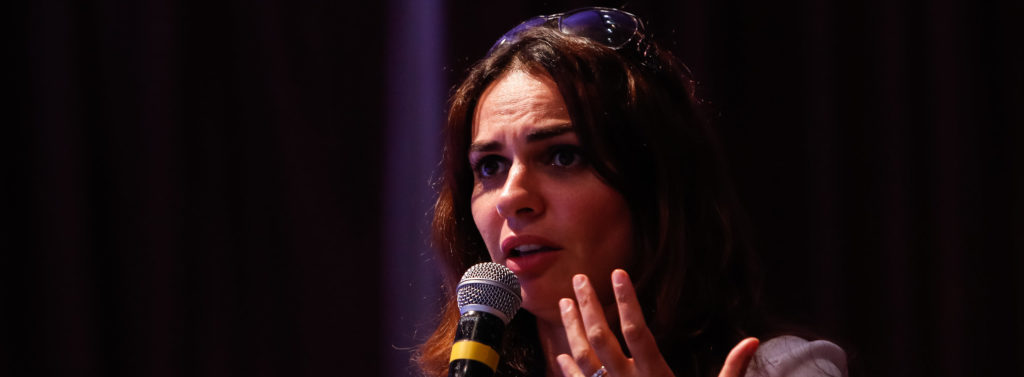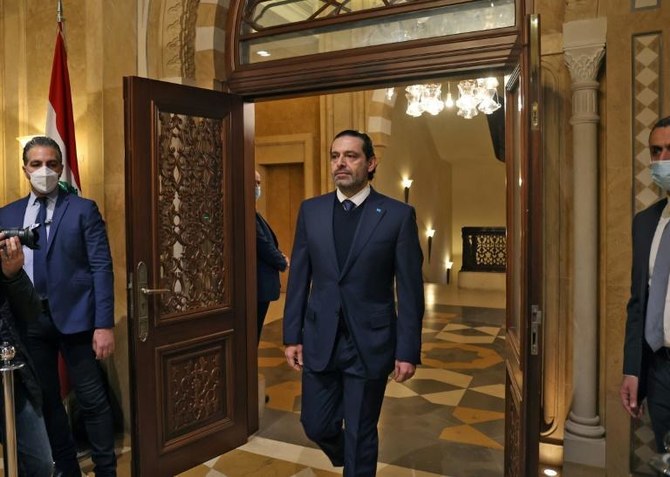Lebanon’s former prime minister Saad Hariri arrives for a press conference in the capital Beirut, Jan. 24, 2022. (AFP)
The Lebanese media last week reported the story of five young men from the north of the country who died while fighting for Daesh. Much emphasis and hype was placed on the citizens being from Tripoli.
Why this effort to demonize Tripoli, the capital of the north, as a hub of Sunni extremism? Actually, it is convenient for Hezbollah to do this, as Sunni extremism has been its greatest ally. The Sunni fundamentalist narrative is also convenient for Saad Hariri, the former prime minister, as he and his movement are supposed to represent “moderation.”
Far from being a hotbed of extremism, Tripoli has been at the forefront of combating terrorism. In 2007, its residents were the first to fight Shaker Al-Absi and his Fatah Al-Islam group in the Bared River battle. Young men from the towns of Bebnine and Al-Abda, close to the Nahr Al-Bared refugee camp, contained the terrorist group until the Lebanese Army arrived.
Tripoli has been home to some of the richest people in Lebanon, including the billionaire and current Prime Minister Najib Mikati. However, its people have been suffering from poverty and deprivation for decades. Tripoli used to be a center for culture and trade on the Mediterranean, but now it is one of the region’s poorest spots. Nevertheless, if you visit the city, you will meet kind, generous and welcoming people and you will realize that all negative propaganda has been created for political purposes.
To examine how Hezbollah uses Sunni terrorism, we need to go back to the beginning of the Syrian war. Initially, when Bashar Assad was losing and soldiers and officers were starting to defect, the dictator needed a helping hand to suppress his people. Hezbollah’s Hassan Nasrallah could not send young men to defend a dictator whose family had made Lebanon suffer for 30 years. The conflict in Syria also had nothing to do with the group’s original mandate, which was fighting Israel. So Nasrallah invented the excuse that Hezbollah had to protect the tomb of Zeinab from the march of the Umayyads — even though the last of the Umayyads perished during the Reconquista in Spain 600 years ago. The excuse was not convincing. Nasrallah showed confusion and gave contradictory explanations for the group’s intervention. Then Daesh emerged, which was a gift for Hezbollah. The terrorist group represented an existential threat to the Shiites. The Takfiris who consider Shiites and other sects to be apostates and want to annihilate them gave Hezbollah an excellent excuse to rally people around it.
Today, the group is facing scrutiny from its own constituency. Hezbollah has paralyzed the government and is holding the country hostage, just for Iran to have stronger bargaining power at the nuclear deal talks in Vienna. More and more people from the Shiite community are realizing that and asking themselves what has become of the “resistance” project. Ultimately, beyond the slogans, people’s main aim is to live with dignity. So now is the time for Hezbollah to highlight the perceived existential threat once again.
The Sunni fundamentalist narrative is needed to rally the Shiites and part of the Christian population. It allows Hezbollah to portray itself to the international community as the lesser of two evils. After all, didn’t the international community allow the creation of the Popular Mobilization Units in Iraq for the purpose of fighting Daesh? The world saw in the pro-Iran militias a lesser evil than Daesh. In fact, it created a monster that is every bit as bad.
As for Hariri, he is known to live a lavish lifestyle. In 2019, he transferred $16 million to a 20-year-old South African swimwear model at a time when he had not been paying his employees. Because of this and his spineless attitude toward Hezbollah, his popularity has faltered. This is visible in his support base on the street. When he said last month that he would not run in the elections in May, the number of his supporters who took to the streets was nothing compared with those who protested in February 2011, when his government fell following the resignation of 11 ministers. Saudi Arabia also stopped supporting him after he failed in terms of governance, as well as in containing Hezbollah.
The Sunni fundamentalist narrative is needed to rally the Shiites and part of the Christian population.
Dr. Dania Koleilat Khatib
The narrative of fundamentalism is convenient to Hariri as he can present himself to the Saudis and the wider international community as the lesser evil; incompetence is better tolerated than fundamentalism. However, the entire narrative of fundamentalism is not true. Tripoli is not a breeding ground for terrorism and the void created by Hariri’s departure will not be filled by fundamentalists. The city has a vibrant civil society and many patriotic activists who care about the well-being of the people. The international community should lend a helping hand and fund development projects in the city to alleviate its poverty. Most importantly, they should not be fooled by the cliche of Sunni fundamentalism.
Read the original article on Arab News.


